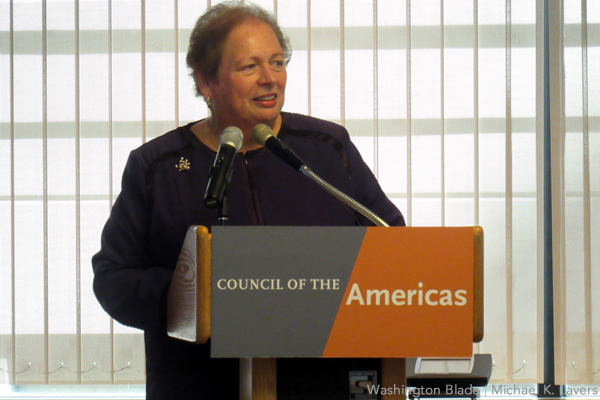Uruguay, Argentina Ranked Most LGBT-friendly Latin American Countries
A report that the Americas Society and the Council of the Americas released on Tuesday indicates Uruguay and Argentina are Latin America’s most LGBT-friendly countries.
The 2016 Social Inclusion Index notes Uruguay “has been a leader” in the LGBT rights movement that has gained traction throughout the region over the last decade.
The report notes Uruguay in 2009 became the first country in Latin America to extend adoption rights to same-sex couples.
Gays and lesbians have been able to legally marry in Argentina and Uruguay since 2010 and 2013 respectively. Both countries also allow transgender people to legally change their gender without undergoing surgery.
Argentina and Uruguay are among the countries that contribute to the Global Equality Fund, a public-private partnership to promote LGBT rights around the world that the State Department manages with the U.S. Agency for International Development.
Uruguay in July hosted the first global LGBT rights conference to have taken place in Latin America. Uruguayan Minister of Exterior Relations Rodolfo Nin Novoa, Special U.S. Envoy for the Human Rights of LGBTI Persons Randy Berry and more than 150 activists from around the world were among those who attended the gathering in the country’s capital of Montevideo.
“The laws that the LGBTI social movements of Argentina and Uruguay have achieved over the last few years have allowed for an opening and social inclusion that has contributed to a climate of respect for sexual diversity,” LGBT Federation of Argentina Vice President Esteban Paulón told the Washington Blade in response to the report.
“Public policies that have broken down barriers and extended equality to lesbians, gays, bisexuals and trans people have also been implemented in both countries,” he added. “The report reflects that this combination of legal framework and public policies has, without a doubt, improved the conditions in which the LGBTI community lives and they are the correct path forward for effectively fighting discrimination.”
Marcela Romero of the Latin American and Caribbean Network of Trans People, which is known by the Spanish acronym REDLACTRANS, also welcomed the report.
“We consider the inclusion of Uruguay and Argentina in the Council of the Americas’ 2016 Social Inclusion Index as the most LGBT-friendly Latin American countries as very positive,” she told the Blade.
Romero — who is also the president of the LGBT Federation of Argentina and the Crossdressers, Transsexuals and Transgender (People) Association of Argentina — told the Blade that hate crimes based on sexual orientation and gender identity remain problems in both countries.
Diana Sacayán, a prominent Argentine trans rights advocate, was stabbed to death in her Buenos Aires apartment in Oct. 2015. She was the third trans person reported killed in Argentina in the span of two months.
“A lot has been achieved under both countries’ gender identity laws, but trans women still continue to suffer violence and are victims of hate crimes,” Romero told the Blade, referring to Argentina and Uruguay and the report. “We have still not achieved the full recognition of rights, such as access to health and employment opportunities.”
“There is still much work to be done to achieve real equality,” she added. “The policies of these countries should be a model for other Caribbean and Central American countries in which our community faces constant violence, stigma and discrimination and do not have access to their social, economic and cultural rights.”
Index ranks countries on women’s rights, racial equality
The report also ranked countries based on women’s rights, their policies towards ethnic and racial minorities and other factors.

Acting Assistant Secretary of State for Western Hemisphere Affairs Mari Carmen Aponte speaks at the Americas Society and the Council of the Americas in D.C. on Oct. 24, 2016. (Washington Blade photo by Michael K. Lavers)
Acting Assistant Secretary of State for Western Hemisphere Affairs Mari Carmen Aponte on Tuesday noted U.S. embassies and consulates around the world “regularly advocate for the human rights of LGBTI persons.” She conceded there is “considerable work that still needs to be done” to address social exclusion across the region.“Creating more inclusive societies means addressing the multiple forms of discrimination and violence,” said Aponte.
Aponte was the U.S. ambassador to El Salvador from 2012 until late last year.
The Central American country that borders Guatemala and Honduras has one of Latin America’s highest murder rates.
Francela Méndez Rodríguez of Colectivo Alejandría, a local trans advocacy group, was murdered in May 2015 while visiting a friend’s home near the Salvadoran capital of San Salvador. Espacio de Mujeres Lesbianas por la Diversidad Sexual, an advocacy group known by the Spanish acronym ESMULES, said their offices were broken into a few weeks later after its executive director publicly denounced the four police officers who attacked a trans activist after he attended a Pride celebration.